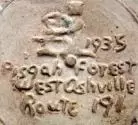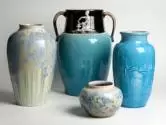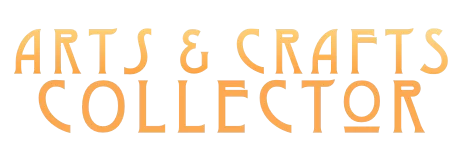Pisgah Forest Pottery

“Pisgah Forest and Nonconnah, The Potteries of Walter B. Stephen”
Inspired by the Arts & Crafts Movement, Walter B. Stephen and his mother began their first pottery, Nonconnah, near Memphis, Tennessee about 1904. Without prior experience, they produced slip-decorated pottery of exceptional merit. Stephen created the shapes to which his mother applied multicolored floral decorations on matte green backgrounds.
Stephen moved to Skyland, North Carolina in 1913 where he established a second Nonconnah Pottery, the first full-time art pottery in the state. In 1926, Stephen began the operation of his third pottery, Pisgah Forest. Here he explored Oriental glazes and forms, pioneered the first crystalline glazes in the South, and developed his cameo wares which resemble English Wedgewood jasperwares. However, unlike the English wares, Stephen’s work was not molded but created from hand painted multiple layers of porcelain. Reflective of his early experiences in the West, Stephen’s porcelain cameo scenes included covered wagons, Indian hunts, cabins, fiddlers and other scenes of American folk life.
Stephen’s story reflects the determination of an American pioneer who not only created unique American art pottery, but also made his buildings, homes, tools, glazes and equipment. He was an early member of the Southern Highland Craft Guild and lifelong supporter of handicrafts in the western North Carolina mountains.
Pisgah Forest and Nonconnah pottery have gained national recognition from numerous museums and private collectors. Major exhibitions of Stephen’s work have been held at the Mint Museum in Charlotte and the Asheville Art Museum in North Carolina, the Memphis Brooks Museum of Art in Tennessee, and the McKissick Museum in Columbia, SC. Recent auctions set record prices with a Pisgah Forest cameo example bringing over $9000 and a Nonconnah vase going for $8700.
Presently owned by Thomas Case, Stephen’s step-grandson, this pottery site is the best preserved historic pottery in North Carolina. Virtually unchanged from the 1920s, the workshop still contains the 1917 clay filter press, the 1929 wood kiln, and early containers of glaze ingredients from the 1920s.
Further information on Walter Stephen’s life and pottery achievements are available in the book “Pisgah Forest and Nonconnah, The Potteries of Walter B. Stephen,” written by Rodney Leftwich.
For additional information, please contact:
Rodney H. Leftwich
Leftwich Folk & Art Pottery
166 Bane Road
Mills River, NC 28759
828 890-3053

